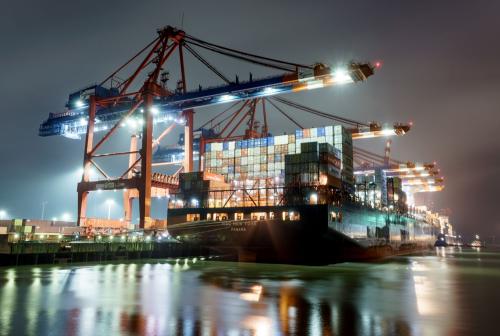U.S. Secretary of State John Kerry Travels to Addis Ababa, Juba, Kinshasa and Luanda
On Thursday, U.S. Secretary of State John Kerry arrived in Addis Ababa, Ethiopia, his first stop on his visit to Ethiopia, South Sudan, the Democratic Republic of the Congo and Angola. The top items on the secretary’s agenda include discussing regional security issues—including those in South Sudan and the Central Africa Republic—speaking out against recent human rights abuses in the region and advancing opportunities for economic development. Already, Kerry advocated for the release of nine journalists and bloggers arrested by the Ethiopian government for “working with a foreign organization to incite public violence.” He also met with Ethiopian, Ugandan and Kenyan leaders to discuss possible economic sanctions on South Sudan as well as a potential travel ban.
Kerry is currently in Juba, South Sudan meeting President Salva Kiir to argue for peace in the 4-month-old civil war. Kerry has warned that the conflict may lead to genocide and has raised the flag to warn of a possible famine. This morning, USAID Administrator Raj Shah emphasized the danger and deadly consequences of a famine in the region.
Kerry’s next stop is Kinshasa in the Democratic Republic of the Congo where he will focus on long-term stability and justice or amnesty for former rebels. Finally, Kerry will finish his trip in Luanda, Angola where he plans to commend President José Eduardo dos Santos for Angola’s leadership in the International Conference on the Great Lakes Region and Angola’s push for solutions for crises in the Democratic Republic of the Congo and the Central African Republic. Kerry will also discuss bilateral policy and trade issues with Foreign Minister Georges Chikoti.
Overlapping with Kerry’s visit, Chinese Premier Li Keqiang will also travel to African nations—including Angola—for additional energy deals to promote economic partnerships as well as development aid for the region. France also recently welcomed President dos Santos in hopes of increasing investment opportunities and securing overseas contracts there.
Kerry’s visit has been met with criticism: Some believe that this trip signifies heightened U.S. competition with countries such as China and Brazil to increase its own interests in the oil-rich nations of South Sudan and Angola. On the other hand, others claim that conflict resolution and peace are more central to this visit than economic interests. Center for Global Development Chief Operating Officer and Senior Fellow Todd Moss argues that Kerry’s visit will focus on security while serving as a preview for the upcoming U.S. Africa Leaders’ Summit.
South Africa Prepares for May 7’s Presidential Election
After celebrating its 20th anniversary since the historic post-apartheid election, South Africa will hold its general election on May 7, marking its first since Nelson Mandela’s death.
This year’s election has centered on a few key issues. The economy has stagnated while other African nations undergo economic booms, and unemployment has sharply risen, with a third of the working-age population now unemployed. Union members have been striking for better wages in South Africa’s platinum belt. Corruption is also an important issue, as reports of widespread fraud (e.g., President Jacob Zuma’s controversial $23 million security upgrades for his private home that included a swimming pool and a chicken run) have been in the news
The three largest parties in the running are the current governing African National Congress (ANC), the Democratic Alliance and the Congress of the People. While Mandela’s former party, the Zuma-led ANC, is favored to win, some say that this election may be the last time the ANC will have a wide majority. Importantly, many voters prefer the ANC, but support replacing President Zuma. Experts argue that these trends signify a shift in the country’s political landscape.
U.N. Security Council Lifts Diamond Trade Ban and Eases Arms Embargo on Côte d’Ivoire
On Tuesday, the United Nations Security Council removed a ban on Côte d’Ivoire’s diamond trade, a ban that had been created in 2005 after the civil war in which diamonds helped fund northern rebels. The U.N. Security Council commended the West African country for fulfilling the minimum diamond certification scheme from the Kimberley Process, the international initiative that restricts conflict diamonds. However, the U.N. reported that these restrictions have not prevented the trafficking of Ivorian rough diamonds because of a lack of enforcement by Ivorian authorities.
In addition, Côte d’Ivoire’s arms embargo was also partially lifted to improve security reforms. As U.S. Deputy U.N. Ambassador Jeffrey DeLaurentis told the Security Council, the country has a “need to build capable and professional security forces.” The embargo had been in place since 2004 because of violations of ceasefire agreements during its civil war.



Commentary
Africa in the News: John Kerry Goes to Africa, South Africa Prepares to Vote, and Côte d’Ivoire Diamond Ban Lifted
May 2, 2014